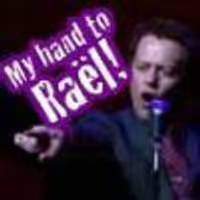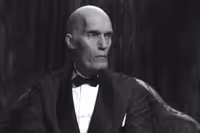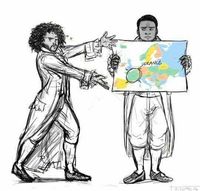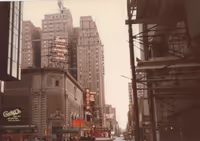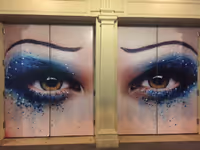Diversity
sciencegirl
Understudy Joined: 3/10/14
#1Diversity
Posted: 6/11/18 at 12:00pm
Watching a lot of interviews celebrating how broadway is celebrating diversity. Some of last nights speeches really got me in the feels....
But - as a latina woman, every time I go to see a show, I am struck by how little diversity is reflected in the audience. There are times I actually count how many other latinos or people of color are in the audience with me. I can usually count us on one hand. Is the diversity shift on stage going to result in a shift in the audiences as well?
I'm not sure what I'm hoping to accomplish with this post. But, I do know you guys are NEVER quiet or shy about expressing your opinions....sooooo
Thoughts? (*drops & runs*)
#2Diversity
Posted: 6/11/18 at 12:04pmI'm Asian American and I've definitely played "spot the Asian" most of the time I've gone to a show (the Bay Area excepted), so I feel you here. I'm not sure if there'll be a marked increase, but it'd be nice...
ScottyDoesn'tKnow2
Broadway Legend Joined: 1/22/14
#3Diversity
Posted: 6/11/18 at 12:07pm
Broadway simply has to be more affordable as a way to introduce musical theatre to communities where it has not laid as big of a footprint AND I hate to say it, but new scores may have to better reflect what people in various communities and in the mainstream are actually listening to these days and sing them in a way that sounds less legitimate (to borrow a phrase from Julie Andrews' character from Victor/Victoria). The way to really reach people outside theater lovers is first through the music itself. I just don't know how new Broadway scores can hit the mainstream or if it's just one of those things that just will never happen ever again.
kmissa
Featured Actor Joined: 4/24/18
#5Diversity
Posted: 6/11/18 at 1:06pm
sciencegirl said: "Watching a lot of interviews celebrating how broadway is celebrating diversity. Some of last nights speeches really got me in the feels....
But - as a latina woman, every time I go to see a show, I am struck by how little diversity is reflected in the audience. There are times I actually count how many other latinos or people of color are in the audience with me. I can usually count us on one hand. Is the diversity shift on stage going to result in a shift in the audiences as well?
I'm not sure what I'm hoping to accomplish with this post. But, I do know you guys are NEVER quiet or shy about expressing your opinions....sooooo
Thoughts? (*drops & runs*)
I think a lot of people just don’t know about affordable options. They assume it’s broadway so it’s expensive. Especially if it’s sold out and they’re looking at stubhub. It takes planning and patience and not everyone (all races) cares to do that. People also have misconceptions of what “musicals” are about. A friends husband swore off musicals Bc his grandmother took him to cats 20 years ago lol.
"
#6Diversity
Posted: 6/11/18 at 1:12pm
I often cite Hamilton as being the poster child that represents the diversity problem that producers have caused in audiences:
A show is written for people of color to take back history. The show is very good and is swooped up by white producers who set ticket prices so high that it prices out most working class people of color. The audience is then filled with white upper class liberals who pat themselves on the back for seeing a show on Broadway that "celebrates diversity" while the people the show was written to celebrate can't even dream of getting tickets to it.
Broadway seems to celebrate diversity just so it can pat itself on it's very white back. If Broadway really celebrated diversity, Broadway would celebrate accessibility.
#7Diversity
Posted: 6/11/18 at 2:51pm
I also was getting the feels with all the diversity speeches last night. I just wish there were more shows with people of color in them. To me it's unacceptable that people of color are typically not seen for "white roles". It's awful that there have only been 2 African Americans to play Phantom on Broadway. Why can't an Asian or Hispanic man play Phantom? Why can't an Asian woman play belle in beauty and the beast? the list goes on....
For an industry that preaches so much on diversity and how much they hate Trump for his divisive language about people of color, Broadway sure hasn't done a damn thing to open it's gates to all people of color.
Lin Manuel said it best: "Broadway doesn't have shows for people who look like me, so I made my own
ScottyDoesn'tKnow2
Broadway Legend Joined: 1/22/14
#8Diversity
Posted: 6/11/18 at 2:59pmIt’s interesting to note that the past ten years or so (at least) I found that the Tonys have had the most diversity in its nominees and winners outside of the Grammys, and yet its the artform that has honestly appealed to the least diverse audience. Of course it also has the smallest sized audience as well. Well unless we’re including ballet and opera in the U.S.
#9Diversity
Posted: 6/11/18 at 3:05pmI don't think it's always cost, though that's a huge factor. It's also — did you go to shows with your family? Has anyone in your family even been to live theatre? You need someone to introduce you to it. For a lot of white Americans, their grandparents regularly went to shows or took them to one. For others? Not so much. Many of my Gen X/millennial Asian American friends have no family history of going to the theatre.
#10Diversity
Posted: 6/11/18 at 3:10pm
I don't think it's a matter of affordability, as there are a ton of cheap options. I think it's just interest. Maybe people dont' know they like or don't have the desire to see it. I mean, I work with a lot of Puerto Ricans and Dominicans who grew up in NYC and didn't know a thing about the theater district or Broadway and have never seen a show. I mean, I got into theater because my parents took me to shows growing up. I mean, it's interesting to me that Fences was this big sell-out hit, but now Denzel is doing this 4 hour Irish drama and it's a pretty easy ticket to get. How come the Black Community came out in droves for that, but not this? Is it the playwright? Is it the play? Etc. Just find it all interesting.
sciencegirl
Understudy Joined: 3/10/14
#11Diversity
Posted: 6/12/18 at 12:38pm
LizzieCurry said: "I don't think it's always cost, though that's a huge factor. It's also — did you go to shows with your family? Has anyone in your family even been to live theatre? You need someone to introduce you to it. For a lot of white Americans, their grandparents regularly went to shows or took them to one. For others? Not so much. Many of my Gen X/millennial Asian American friends have no family history of going to the theatre."
I think you hit the nail on the head. My first show was Phantom with my mostly white high school. My next show was with my best friend and her parents (they were jewish).
A few years ago I did take my family (parents/siblings/nieces/nephews) to see Mama Mia. For all of them, it was their first show. Not the best show, but cheapest for me to buy a dozen tickets to...I may have done more damage than good with that choice, lol.
#12Diversity
Posted: 6/12/18 at 1:01pm
I grew up with musical theatre in the house (not always, but it was there — one of my dad's favorite movies is West Side Story, I was taken to children's theatre starting around age 4, and my parents have a decent amount of cast recordings on vinyl), which I didn't realize until I was in high school was unusual for an Asian American family.
I think it's sort of akin to going to a restaurant whose cuisine or customs are not what you're used to, even if you've eaten out before. If you didn't grow up going to a hookah place, eating sushi, hell, even eating tacos, you probably need or want someone to go with you the first time so they can show you or you can learn together.
#13Diversity
Posted: 6/12/18 at 1:08pm
As far as audience members goes, it really depends on the musical. When I watched the classic revivals Hello Dolly, My Fair Lady, and Carousel, the majority of audience in the orchestra were definitely senior citizens. When I watched Hamilton, Dear Evan Hansen, or any of the Disney musicals, they tend to be younger and more diverse for sure. When I saw ON YOUR FEET! and Latin History for Morons, I felt I saw a lot more hispanics/latinos in the audience than I usually do when seeing other shows.
As for affordability, I think everyone always looks for a discount. As a New Yorker, I know I do especially since I tend to see a show via rush/lottery first. I also think tickets are indeed affordable but for the hit shows, scalpers somehow end up getting a hold of them and reselling at such a high price outside the budgets of most people.
Also, regardless of race, $100 for the average American is a lot of money and seeing theater is a form of luxury. I have friends who would much rather spend $50 at a pub drinking and watching sports on TV rather than doing rush and watch a Bway show. To each his own.
I have learned though that if one really wants to see a show, somehow that person will make it work. Back in college, I wanted to see Cabaret but could not afford tickets. I learned that I could volunteer usher & see the show for free so... I volunteer ushered once every 2 months with my friend Kat for 2 years and it was our Bway outing! Yeah we always sat in the rear mezz during the show but now as an adult in my 30s, we both splurged and bought tickets to sit in the orchestra tables in the recent revival back in 2014.
#15Diversity
Posted: 6/12/18 at 3:31pm
(First off, I’m Asian American.)
Representation does matter, however. When I saw Children of a Lesser God (on Easter Sunday), it was a very mixed crowd with many black people in the audience. If there weren’t a black lead (and several other people of color in the cast), would there be that kind of a turnout for that particular play? I’ve heard black people on the street saying they’re interested in seeing The Iceman Cometh. That’s not something I would ever hear a white person on the street say about any Eugene O’Neill play. It really matters to have that visibility. Yes, these plays didn’t sell out, but that’s not because of anything other than the plays/productions themselves, I believe. They did get noticed by the people paying attention.
It’s the same thing that happened when I saw Latin History for Morons. And I happened to attend “Pinoy Night” at Once On This Island because Lea Salonga is in the cast. These shows actually do bring in the right people when the diversity onstage is prominent and marketed unabashedly.
The Hamilton thing, yeah, that’s a real problem. It’s like the people of color reclaimed something and the rich white people snatched it right up and made it only accessible to themselves. I wish there were a way to fix this. I’m not sure if it’s even popular among non-theatregoing people of color because it’s just that exclusive.
It’s really miraculous that people of color (especially Latinx and Asian people) have any kind of interest in the theatre when in 2018 we’re still reveling in the small victories like Lindsay Mendez winning a Tony for a “white” role and Ruthie Ann Miles being the second Asian woman ever to win a Tony.
#16Diversity
Posted: 6/12/18 at 3:46pm
It was weird to see the crowds outside the Richard Rodgers get whiter and whiter as the years went on, although it seems to be getting closer to the diversity I saw in previews.
I still maintain that the most Asian American audience I ever saw at a show that starred no Asians (other than Christopher Kale Jones, who is 1/4 Japanese but this was never used in any kind of marketing) was Jersey Boys on tour in San Francisco, for whatever reason. I always found this intriguing!
My cousin and her boyfriend just visited NYC from SF for the first time in about three years. They're not theatergoers and are more sports fans/foodie people. They didn't know Mean Girls or SpongeBob were even musicals, but they did know about Hamilton (mostly because the tour was in SF, though).
ScottyDoesn'tKnow2
Broadway Legend Joined: 1/22/14
#17Diversity
Posted: 6/12/18 at 3:56pm
The most Asians I've ever saw in the theatre from personal experience was The King and I, but they seemed more like Asian tourists than Asian-Americans. Not sure how I could tell that, but just a vibe I received. I wonder how the make-up was for Allegiance, Flower Drum Song (2003), K-Pop, Miss Saigon (both original and 2017) and Here Lies Love. Obvs there wasn't much of an audience of any kind for Allegience and Flower Drum Song as those shows closed relatively early in their runs. Miss Saigon also closed earlier than those Cameron Mackintosh productions tend to close.
#18Diversity
Posted: 6/12/18 at 4:01pmI saw Allegiance twice on Broadway — once in previews and once a week before it closed. I couldn't give you a percentage, but I can say that was both times, it was probably the most diverse Broadway audience I'd been a part of since Hamilton in previews on Broadway and Taye Diggs' first Hedwig.
LaneBryant
Understudy Joined: 12/20/15
#19Diversity
Posted: 6/12/18 at 5:05pm
I mean, it's interesting to me that Fences was this big sell-out hit, but now Denzel is doing this 4 hour Irish drama and it's a pretty easy ticket to get. How come the Black Community came out in droves for that, but not this? Is it the playwright? Is it the play? Etc. Just find it all interesting."
Hmmmm You really don't know? Did you see how Fences was marketed? Did you see the number of Black faces and names on the flyer? They actually marketed it TO the Black audience. It's written by August Wilson. They made it feel familiar and inviting. Iceman Cometh isn't that. It's Denzel and 20 white men, and it's 4 hours long with 3 intermissions. In it's marketing and presentation, it feel exclusive and not inclusive. It' not that interesting or hard to figure out.
Broadway has been and is a white mans game. Marketing and cost play HUGE parts. The Hamilton audience is white a HELL. The diversity is only on the stage (and honestly, its not that diverse in some cases). smh
VintageSnarker
Broadway Legend Joined: 1/30/15
#22Diversity
Posted: 6/12/18 at 8:40pmLizzieCurry said: "I'm Asian American and I've definitely played "spot the Asian" most of the time I've gone to a show (the Bay Area excepted), so I feel you here. I'm not sure if there'll be a marked increase, but it'd be nice..."
Same Lizzie. I actually feel like the Asian American community does see a fair amount of theater (and opera, dance, etc.) but not enough to really make a dent percentage wise in the audience. I think on stage diversity definitely makes a difference. While there were still primarily white audiences when I saw The King and I and Allegiance, there were definitely more Asians in the audience than at a typical show. At least with Ken Watanabe. And the most diverse audience I remember seeing at a show is The Color Purple. While I personally appreciate colorblind casting, I don't think it makes a huge difference to many audience members because it doesn't change the issue of not seeing your stories and your experience reflected on stage.
Also, while I'm used to it, those predominantly white audiences can put out an unwelcoming vibe.
Wayman_Wong
Broadway Legend Joined: 4/22/04
#23Diversity
Posted: 6/13/18 at 6:04pm
I imagine why there are more Asian-American theatergoers could be due to cultural and financial issues. Speaking for myself, my parents grew up in rural China in poor families; they never went to the theater, and therefore never were instilled with that tradition, nor passed it on to me. I only started going to theater because a high school teacher had an extra ticket to ''Pacific Overtures'' ...
I once interviewed Mako (''Pacific Overtures'' ), and he told me that he was frustrated that more Asian-Americans didn't support their own artists. He pointed out that the better-off Asian-Americans would go to see the Broadway tours at the Dorothy Chandler Pavilion in Los Angeles (because it was a sign of status), but those same folks seldom came to his home-grown theater, East West Players, to see Asian-American actors in Asian-American plays.
In 1990, I was fortunate enough to have my first play, ''Whiskey Chicken,'' produced at the Asian American Theatre Company in San Francisco. It got pretty good reviews, got extended and became the theater's biggest commercial hit (at that time) and earned me a playwriting award from Drama-Logue magazine. I recall our audiences were 50-50. Half-Asian, half-Caucasian. I had written a comedy about a Chinese-American family in the '50s. After one performance, a white patron asked me if I was the author. I said I was, and she told me that her immigrant father was exactly like the crusty and cranky Chinese father in my play.
When theater works, it's so universal in speaking to everyone.
VintageSnarker
Broadway Legend Joined: 1/30/15
#24Diversity
Posted: 6/14/18 at 12:01am
Wayman_Wong said: "I once interviewed Mako ('Pacific Overtures' ), and he told me that he was frustrated that more Asian-Americans didn't support their own artists. He pointed out that the better-off Asian-Americans would go to see the Broadway tours at the Dorothy Chandler Pavilion in Los Angeles (because it was a sign of status), but those same folks seldom came to his home-grown theater, East West Players, to see Asian-American actors in Asian-American plays.
That's a valid point. Part of the problem is that if you aren't cultivating a theater-going audience, you can't expect them to show up for every little thing. You reminded me of two recent shows, Vietgone (MTC) and Aubergine (Playwrights Horizons). I saw both with predominantly white audiences even though they are plays about the Asian American experience. I actually don't think the number of Asians in the audience was any different than seeing a show with an entirely white cast. I thought the first play was a little clunky but I admired its willingness to try something different and the second one was fairly lazy. Frankly, I wouldn't have blamed any audience members for skipping either play as I don't think they were worth a full priced ticket. But I also don't think many people were aware of either play who aren't frequent theatergoers. Everyone doesn't keep up with off-Broadway.
I think there are also limitations in the kind of stories being told. Moviegoers are tired of slavery narratives. I think there's a similar fatigue with theatergoers. I feel like the majority of stories with black characters have something to do with racism and the majority of stories with Asian characters have something to do with the immigrant experience. Those are valid stories to tell but they shouldn't be the only stories we're telling.
Wayman_Wong
Broadway Legend Joined: 4/22/04
#25Diversity
Posted: 6/14/18 at 1:39am
If you're seeing ''Vietgone'' at MTC and ''Aubergine'' at Playwrights Horizons, let's face it: Those are overwhelmingly white subscription audiences, and most of the plays in their season are usually by Caucasians about the Caucasian experience. Kudos to those theaters for including playwrights of color, but that's not their focus. At the risk of overgeneralizing, theatergoing hasn't been a big part of the Asian culture (or that of others), so there's a learning curve that's involved. Audiences of color need to be cultivated and nurtured. But it takes time. As theater offerings become more diverse, I hope so, too, will the people who go to see them.
Updated On: 6/14/18 at 01:39 AMVideos


